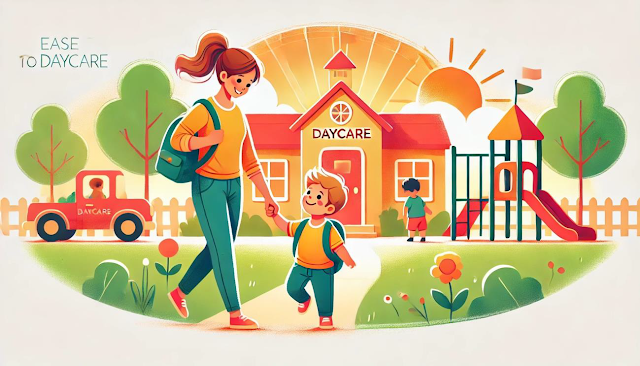Starting daycare is a significant milestone for both parents and children. For many, it represents the first time a child is away from their parents for an extended period, while for others, it's the beginning of a structured routine that fosters social interaction, independence, and development. However, the transition to daycare can be challenging for children and their families. Understanding what to expect and learning how to ease this transition can help create a smoother experience for everyone involved.
In this blog, we will explore what you can expect when preparing your child for daycare and provide strategies to make the transition as comfortable as possible.
What to Expect When Your Child Starts Daycare
1. Separation Anxiety
One of the most common challenges when starting daycare is separation anxiety. It's normal for young children to feel anxious when they're separated from their parents or caregivers. They may cry, cling to you, or show resistance when it's time to go to daycare. This is a natural response, as young children are still developing a sense of security and trust with new environments and people.
2. Changes in Routine
Daycare introduces a structured routine that may be different from what your child is used to at home. From scheduled meals and naps to playtime and learning activities, this structure can initially feel overwhelming. Children who are used to having more free playtime or a less rigid routine may need some time to adjust.
3. New Social Interactions
For many children, daycare is their first opportunity to regularly interact with other kids. While this is beneficial for social development, it can also be challenging for children who are shy or less comfortable in group settings. They may need time to learn how to share, communicate, and build relationships with their peers.
4. New Caregivers
Adjusting to new caregivers is another significant change. Children need to develop trust and rapport with the daycare staff, which can take time. It's important to expect some initial resistance, but most children will gradually adapt to their new caregivers and start forming bonds.
5. Emotional Ups and Downs
In the early days of daycare, your child may experience emotional ups and downs. They might be excited one day and resistant the next. These fluctuations are normal as your child navigates new emotions and experiences. It's important to provide them with comfort and reassurance during this transition period.
How to Prepare Your Child for Daycare
1. Introduce the Concept of Daycare Gradually
One of the best ways to prepare your child for daycare is to start talking about it early. Use positive language and explain that daycare is a place where they will meet new friends, play with toys, and learn fun things. You can read books about daycare or tell stories that involve characters who go to daycare. The goal is to make daycare seem exciting and welcoming.
2. Visit the Daycare Center Together
If possible, arrange a visit to the daycare center with your child before their official start date. Let your child explore the space, meet the caregivers, and observe the other children. This visit can help reduce fear of the unknown and provide your child with a sense of familiarity when the big day arrives.
3. Create a Goodbye Routine
Develop a goodbye routine that is consistent and comforting. For example, you can give your child a hug and kiss, say a special phrase like, “I’ll see you after lunch,” and then hand them to the caregiver. Keep the goodbye short and sweet to avoid drawing out the separation. A consistent goodbye routine helps your child feel more secure and signals that you will return after daycare.
4. Practice Independence Skills
Daycare will require your child to be somewhat independent, especially during meal times, playtime, and bathroom breaks. You can begin to prepare your child by practicing skills such as using a spoon, washing hands, or putting on their shoes. The more independent they feel, the easier it will be for them to adjust to daycare routines.
5. Establish a Pre-Daycare Routine
In the weeks leading up to daycare, establish a morning routine that mirrors what will happen on daycare days. For instance, wake your child at the same time, eat breakfast together, and have some playtime. This consistency will make the transition smoother once daycare starts.
6. Use Comfort Items
Allow your child to bring a comfort item from home, such as a favorite blanket, toy, or stuffed animal. These items can provide emotional support during the day, especially in the early stages of daycare. Having something familiar can help your child feel more secure in an unfamiliar environment.
How to Ease the Transition During the First Few Weeks
1. Start with Shorter Days
If your child is struggling with the transition, consider starting with shorter days and gradually increasing their time at daycare. This gives them time to adjust without feeling overwhelmed. Over time, as they become more comfortable, you can extend their time at the center.
2. Talk About Daycare Positively
Once your child starts daycare, continue to talk about it in a positive way. Ask open-ended questions like, “What was your favorite part of the day?” or “Did you play with any new toys today?” By focusing on the positives, you reinforce the idea that daycare is a fun and exciting place.
3. Be Consistent
Consistency is key during this transition. Drop your child off at daycare at the same time every day, follow the same goodbye routine, and pick them up at a predictable time. Consistency helps children understand what to expect and provides them with a sense of security.
4. Expect Ups and Downs
The first few weeks of daycare can be unpredictable. Some days your child may seem excited to go, while other days they may resist. It's important to remain patient and understanding. These ups and downs are normal, and over time, most children will adjust to the routine.
5. Stay Calm and Confident
Children are perceptive and can pick up on your emotions. If you're anxious or hesitant about daycare, your child is likely to sense it and feel the same way. Stay calm, confident, and reassuring when dropping off your child. Let them know that daycare is a safe and fun place where they can learn and play.
Addressing Challenges During the Transition
1. Dealing with Separation Anxiety
Separation anxiety is one of the most common challenges during the daycare transition. To help ease this anxiety, maintain a predictable routine, reassure your child that you will return, and provide positive reinforcement when they successfully stay at daycare. Over time, as your child becomes more comfortable with the new environment, the separation anxiety should lessen.
2. Handling Emotional Outbursts
If your child experiences emotional outbursts, such as crying or tantrums, during the daycare transition, it’s important to remain patient and supportive. Acknowledge their feelings by saying things like, “I know it’s hard to say goodbye,” but gently encourage them to engage with their caregivers and friends. Daycare providers are also experienced in helping children navigate these emotions and can be a great support.
3. Communicating with Caregivers
Good communication with your child’s daycare providers is essential for a smooth transition. If your child is struggling with the adjustment, share any concerns with the caregivers and ask for their advice. They may be able to offer insights or suggest specific strategies to help your child feel more comfortable.
4. Recognizing the Signs of Daycare Readiness
While many children adapt to daycare quickly, some may need more time. If your child continues to struggle after a few weeks, it’s important to recognize the signs of daycare readiness. Some children may not be developmentally ready for full-time daycare and might benefit from shorter days or a slower introduction to the environment.
Supporting Your Child’s Development Through Daycare
1. Encouraging Social Development
Daycare provides an excellent opportunity for your child to develop social skills, such as sharing, taking turns, and communicating with others. You can support this development by reinforcing these skills at home and praising your child when they show positive social behavior.
2. Building Independence
Daycare helps children build independence as they learn to navigate daily routines on their own. You can encourage this independence by allowing your child to practice self-care skills, such as dressing themselves or tidying up their toys, at home.
3. Promoting Emotional Resilience
The transition to daycare can help children develop emotional resilience as they learn to cope with new situations and environments. By providing your child with support, reassurance, and opportunities to express their feelings, you can help them build the emotional strength they need to handle challenges.
The Role of Parents in a Successful Transition
1. Staying Positive
Your attitude towards daycare plays a significant role in how your child views the experience. Stay positive and enthusiastic about daycare, and your child is more likely to adopt a similar attitude.
2. Being Involved
Stay involved in your child’s daycare experience by asking them about their day, attending any daycare events, and staying in touch with the caregivers. Your involvement will help your child feel more secure and supported.
3. Allowing Time for Adjustment
Every child adjusts to daycare at their own pace. Some may take a few days, while others may need a few weeks or months. It’s important to allow your child the time they need to adjust and to provide ongoing support throughout the process.
Conclusion
Preparing your child for daycare is a significant and sometimes emotional experience, but with the right approach, it can be a smooth and positive transition. By understanding what to expect and following the strategies outlined above, you can help your child adjust to their new environment with confidence and ease. Daycare is a positive step in your child's development, offering them the chance to learn new skills, build relationships, and grow in independence. As a parent, your role in supporting them through this transition is crucial, and by fostering a positive attitude, maintaining consistency, and being patient, you set the foundation for a successful experience.
Remember, every child’s journey is unique. Whether your child takes to daycare quickly or needs more time to adjust, know that with love, understanding, and thoughtful preparation, they will eventually thrive in this new environment. The benefits of daycare go beyond just caregiving—it’s a place where children grow socially, emotionally, and intellectually, setting the stage for future success.
As you prepare your child for this significant step, keep in mind that the initial challenges are only temporary, and soon enough, your child will eagerly look forward to their daycare days, filled with learning, play, and new friendships.
Key Takeaways:
• Separation anxiety is normal but manageable with consistency and patience.
• Prepare your child gradually by introducing them to the concept of daycare through positive reinforcement and familiarization.
• Routines—both at home and daycare—play a crucial role in easing the transition.
• Communication with daycare caregivers helps ensure that your child’s needs are being met, and gives you peace of mind.
• Every child adapts at their own pace, and that’s okay. Allow your child time to adjust while offering support along the way.
By following these guidelines, you'll help ensure that your child's transition to daycare is as smooth and comfortable as possible, setting them on the path to thrive in their new learning environment.






No comments:
Post a Comment